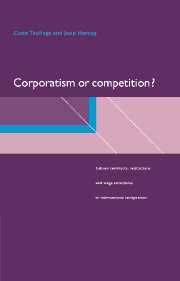 Corporatism or Competition?
Corporatism or Competition? Book contents
- Frontmatter
- Contents
- Preface
- Symbols and abbreviated references
- Synopsis
- 1 What we observe and what we claim
- 2 The role of corporatism in models of surplus sharing
- 3 Beliefs, norms and institutions
- 4 Union behaviour
- 5 Wage differentials and rent sharing
- 6 Tenure wage profiles
- 7 Unemployment and wage flexibility
- 8 Inside corporatism: how the Dutch play their game
- 9 An assessment: competition or corporatism?
- References
- Index
1 - What we observe and what we claim
Published online by Cambridge University Press: 23 November 2009
- Frontmatter
- Contents
- Preface
- Symbols and abbreviated references
- Synopsis
- 1 What we observe and what we claim
- 2 The role of corporatism in models of surplus sharing
- 3 Beliefs, norms and institutions
- 4 Union behaviour
- 5 Wage differentials and rent sharing
- 6 Tenure wage profiles
- 7 Unemployment and wage flexibility
- 8 Inside corporatism: how the Dutch play their game
- 9 An assessment: competition or corporatism?
- References
- Index
Summary
What we claim
Are competitive labour markets better than highly institutionalized corporatist labour markets? Would they have brought cherished flexibility where corporatism imposes dreadful rigidity? Is, say, the United States labour market, with its ‘decentralized heterogeneity’ (Flanagan, 1993) more efficient than the Austrian labour market, with its tight, centralized organization? National labour markets differ across a wide spectrum in labour market organization, institutions and labour legislation – how relevant is this variation in the mode of transacting for wage levels and wage structure?
The basic claim of this book will be that corporatism serves to reduce exploitation of local rents, and that this enhances efficiency. More corporatist labour markets have wage structures with smaller interindustry differentials, smaller tenure effects and smaller firm size effect. Corporatism, however, does not seem to obstruct the price mechanism with respect to schooling levels.
To explain these findings, we start from the individual employment contract and we argue that there is a delicate balance between flexibility and stability. Wage rigidity in the form of advance specification of wages may improve the efficiency of separation decisions and will safeguard and stimulate investments. These benefits can be obtained if partners abstain from contract renegotiation as much as possible. But adjustment to shocks that are not specific to the bargaining partners is still desirable. With difficult disentanglement of aggregate and idiosyncratic shocks, corporatist institutions can play a valuable role: they can take care of adjustment of the contract to the aggregate shocks, while maintaining firm and worker's commitment not to renegotiate the contract.
- Type
- Chapter
- Information
- Corporatism or Competition?Labour Contracts, Institutions and Wage Structures in International Comparison, pp. 25 - 63Publisher: Cambridge University PressPrint publication year: 1998


